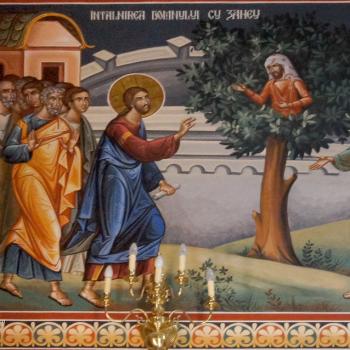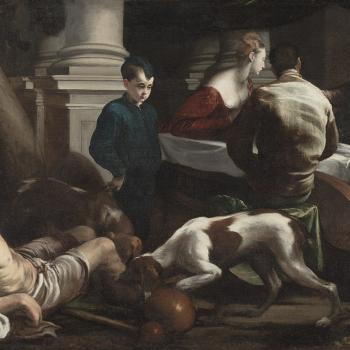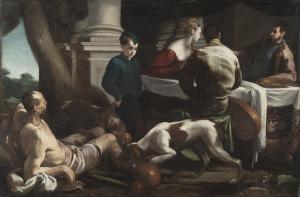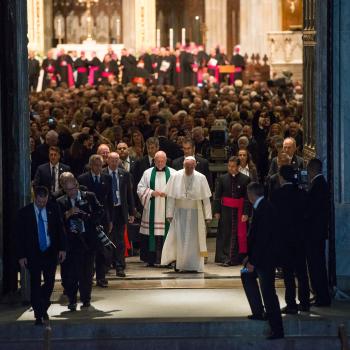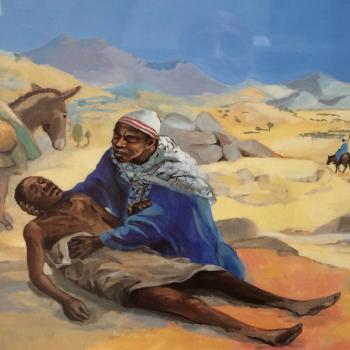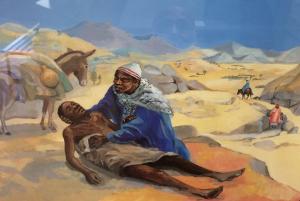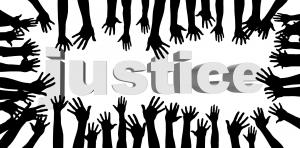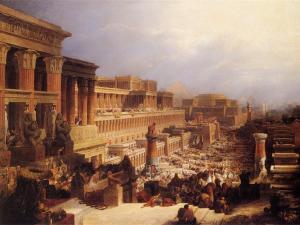
Zacchaeus, even if he tried to be an ethical tax collector, still was a tax collector, and he made his money, his wealth, on the backs of others. Tax collecting was much different in ancient Rome than it is today, as tax collectors were given a percentage of the money they collected as their pray. He was not as bad as they could come. He wanted to think good of himself. He knew tax collecting was important, even if the method of collection needed reformation. And, as he tried to be ethical, he likely hid from himself the injustices involved in the way he went about his work. Perhaps he reflected upon what he did and how he did it better than others, that is, that he was not as cruel as many of his fellow tax-collectors. Nonetheless, he still made his money in ways which were cruel and unjust. He found a way to game the system, making a significant amount of wealth for himself. This is why, when he encountered Jesus, he eventually had to admit to himself and to Jesus that he was far from the ethical man he had assumed himself to be. And so, as a part of his metanoia, he made it clear he would more than give back not only the money he unjustly took from others, he would pay it back with interest:
And Zacchaeus stood and said to the Lord, “Behold, Lord, the half of my goods I give to the poor; and if I have defrauded any one of anything, I restore it fourfold.” And Jesus said to him, “Today salvation has come to this house, since he also is a son of Abraham. 0 For the Son of man came to seek and to save the lost” (Lk. 19:8-10 RSV).
Zacchaeus’s salvation was possible thanks to Jesus and the grace which Jesus offered him. Nonetheless, to activate that grace and be saved, he had to cooperate with it. He had to change his ways. He had to do what he could do to heal the pain and sorrow he had caused others to suffer. He couldn’t just ask for forgiveness and remain the same. He certainly could no longer keep the blood money he had collected. To make sure that he did not go back to his old ways, he wanted to make sure the money which was legitimately his was used justly, which is why he decided he would use it to help the poor, redistributing his wealth, making things fairer for all. We should see in his story not only a warning of the judgment which is to come we take and appropriate wealth unjustly for ourselves, but also the hope that such judgment and the condemnation which it could bring does not have to be the final word, that we, upon realizing the evil we had done can still repent and find salvation. St. Jerome, with his critical view of the rich, said that this means those who are wealthy must ponder how that wealth was accumulated. In doing so, they will see injustices were involved, and once they do, they will have to come to terms with their obligations to their community, starting with the fact that they must help those who have been hurt by such injustices. If they do so, they will replace illegitimate earthly treasure, the kind which does not last forever, with heavenly treasure, a treasure which not only lasts, but can and will be accumulated through justice:
Much truth there is, indeed, in a certain saying of a philosopher: ‘Every rich man is either wicked or the heir of wickedness.’ That is why the Lord and Savior says that it is difficult for the rich to enter into the kingdom of heaven. Someone may raise the objection: ‘How, then, did the wealthy Zacchaeus enter the kingdom of heaven?’ He gave away his wealth and replaced it at one with the riches of the heavenly kingdom. The Lord and Savior did not say that the rich will not enter the kingdom of heaven, but that they will enter with difficulty. [1]
Zacchaeus, in his own way, serves as a representative of the wealthy in general. Not all the rich have gained their wealth in the same way. Nonetheless, due to the way economics works, it is difficult, if not impossible, for someone to gain extraordinary amounts of wealth in a perfectly just fashion. There will always be some sort of injustice directly or indirectly connected to the accumulation of massive amounts of wealth. And usually, once someone gains more wealth than they need, they will not be satisfied. They will seek to accumulate more and more, and in doing so, taking away the goods of the earth from those who need them. Thus, they fall into the sin of avarice, which is not a minor thing, for avarice, the love of money, can be said to be a root of all evil. Its call, its influence, if not put into check, will be unending. It will suggest to someone to find more and more wealth instead of justly using what one has, and distributing what is in excess to those in need.
St. Hildegard warned that avarice leads to idolatry, as it has people make money their god, leading them to separate themselves from the true God through their wealth: : “But you who love injustices, keep this admonition in mind, so that you may know that your avariciousness longing for wealth is idolatry, and that it separates you from the angelic orders, that is, from spiritual people, just as the idol of deceit is separated from the true God.” [2] This does not mean God will not come looking for them – for indeed, as the story of Zacchaeus shows, God does indeed try to get past the barriers people put up. God goes looking for them, engages them, and helps them put away from all the barriers they have put up, so that realizing their errors, they can be like Zacchaeus and find salvation. But we must also see the story as warning to us all, especially to those of us who are not yet rich, making sure we do not take on an avaricious attitude ourselves. We do not have to disregard earthly needs, but we must make sure our pursuit of them is limited to what is just and necessary; if not, as Xunzi noted, we can find ourselves having an never-ending desire to accumulate goods which we do not need:
The natural disposition of people is that for food they want meats, for clothes they want embroidered garments, for travel they want chariots and horses, and moreover they want the riches of surplus wealth and accumulated goods. Even if provided these things, to the end of their years they would never be satisfied; this is also the natural disposition of people. [3]
It is best to remember that the world and all that is in it is meant for the common good, and it is when that common good is lost, that we find the love of money, the love of wealth, dividing up humanity, and in that division, set up a great amount of evil in the world. Ficino pointed out that this was something that the wisest philosophers came to know and understand, as they all saw those who became so attached to earthly goods became possessed by those very goods:
He confused his dominion, which was vast by nature, to narrow limits. He introduced into the world ‘mine’ and ‘yours’, the origin of all strife and evil. Thus it was to good purpose that Pythagoras directed that everything should be held in common among friends, and that Plato directed the same among citizens. Therefore, those who are rich should be regarded as most unjust if, because of their pride, they forget God, the bountiful giver of all riches. They make themselves masters over the poor, and call themselves possessors of wealth, when it is they who are possessed by their wealth. [4]
Truly, we must not let avarice and its mode of engaging the world dictate to us how we should live. If we do, we will find ourselves turning against the common good. We will cut ourselves off from each other, fighting for the little which we think we possesses as being ours by right, and in doing so, create and reinforce all kinds of injustices. We risk, moreover, finding ourselves stuck, incapable of getting beyond the cycle of pain and sorrow avarice creates. The story of Zacchaeus shows us the way out. We must come to know ourselves, like he did, and accept the need we have to change, realizing of course, we cannot properly change without grace. This does not mean there has been and is no good in us, it is just that we must not use that good to ignore the evil which we have done. Once we come to terms with what we have done, we will be able to reinforce the good we have done by dealing with and healing the harm we have caused, and then, like Zacchaeus, we will find ourselves truly blessed by gaining the treasure which we should seek, that is, the riches of the kingdom of God.
[1] St. Jerome, The Homilies of Saint Jerome: Volume I (1-59 On the Psalms). Trans. Marie Liguori Ewald, IHM (Washington, DC: CUA Press, 1963), 116-7 [Homily 15].
[2] St. Hildegard of Bingen, “Letter 220r” in The Letters of Hildegard of Bingen. Volume III. Trans. Joseph L Baird and Radd K Ehrman (Oxford: Oxford University Press, 2004), 14.
[3] Xunzi, The Complete Text. Trans. Eric L. Hutton (Princeton: Princeton University Press, 2016), 29.
[4] Marsilio Ficino, The Letters of Marsilio Ficino. Volume 1. trans. by members of the Language Department of the School of Economic Science, London (London: Shepheard-Walwyn, 1975; repr. 1988), 119-20 [Letter 73 to Angelo Poliziano].
Stay in touch! Like A Little Bit of Nothing on Facebook.
If you liked what you read, please consider sharing it with your friends and family!
N.B.: While I read comments to moderate them, I rarely respond to them. If I don’t respond to your comment directly, don’t assume I am unthankful for it. I appreciate it. But I want readers to feel free to ask questions, and hopefully, dialogue with each other. I have shared what I wanted to say, though some responses will get a brief reply by me, or, if I find it interesting and something I can engage fully, as the foundation for another post. I have had many posts inspired or improved upon thanks to my readers.


